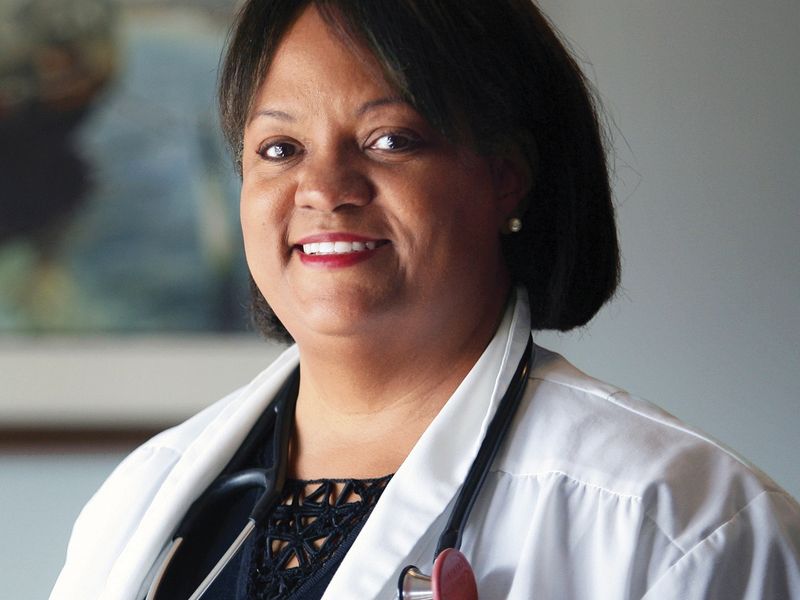Dr. Regina Benjamin 
Dr. Regina Benjamin served as the 18th U.S. Surgeon General
From my days in solo practice in rural Alabama, to organized medicine, to U.S. Surgeon General, to not-for-profit and corporate boardrooms, I have been working to improve the health of our patients and our communities. Throughout my career, I have discovered that trying to move our healthcare system from one focused on sickness and disease to one based on wellness and prevention is easier said than done. Following are few of my observations over the years. After completing residency, the National Health Service Corps sent me to Bayou La Batre—a shrimping village on Alabama’s Gulf Coast. It’s a pretty place but it’s a poor place. I found a community of working poor—too poor to afford medical care, but too rich to qualify for Medicaid. I liked the people. I liked the community. I wanted to practice medicine there, but I quickly learned that practicing medicine wasn’t just sewing up shark bites. I had to deal with the land sharks—the regulators, the reviewers and the red-tape dispensers. I also learned that my patients had problems that my prescription pad alone could not solve. I became involved with every organization and every group that I could to help bring services to our community. I tried to improve healthcare, one patient at a time, but it became clear that I could not do it alone. I would need connections and partnerships if I were going to bring additional programs and services to the town.
Physicians/AMA: As a family physician who was the first person under age 40 and first African-American woman to be elected to the American Medical Association board of trustees, I agreed with a former AMA president’s mantra regarding health reform: “Physicians have to be in the driver’s seat with patients riding shotgun.” AMA policy and positions still follow that premise. Doctors are a central part of healthcare improvement and healthcare teams, but physicians cannot do it alone.Catholic healthcare: In the 1990s, I joined the board of Eastern Mercy Health System. This gave me a front row seat to witness the Sisters of Mercy from various regions come together, and later join with other religious congregations to form the stronger and the more sustainable Catholic Health East, which subsequently became Trinity Health. Other Catholic hospitals also began to partner and merge, resulting in strong systems with more services available to the communities they serve.
Government: When President Barack Obama nominated me as the 18th U.S. Surgeon General, I learned that there are those in government who believe all healthcare problems can be solved by a regulation or a law. While this can be true in some cases, especially in public health, it is not the complete answer.Technology: As I joined governing boards or advisory boards to Silicon Valley startup companies, it became clear that there is a general feeling that every healthcare problem can be solved by technology and/or automation. While much of this innovation can be positive and game changing for healthcare, unfortunately it is also not the single solution.
Corporate boards: Joining corporate boards, I learned that there seems to be is a consensus that healthcare can be solved with a strong business plan, improved efficiency and improved operations. The commercialization of healthcare has led to more emphasis on attracting customers and employer clients, which in turn is beginning to bring the patients’ and employees’ experience and opinions into consideration. While improvement in healthcare is often the common goal, the responsibility of the corporation by design is to improve stockholder wealth.
Healthcare finance/venture capital/M&A: Some in this sector believe that if you throw enough money at the healthcare system its problems can be solved. While we know this is not true, it certainly can get people thinking. Others feel a moral duty and genuine desire to use their gifts and talents to make a difference in overall health. However, founders of startups are often pushed by their investors to scale up quickly and to improve ROI. This can be beneficial, especially in population health, but can also overlook those who are not traditionally seen as significantly adding to increased profit margins—the poor, the underserved, the underinsured. Today, decades after arriving in the Bayou, I have come to understand that it takes all of the above components—and all of us—to work together for the common good in order to improve the U.S. healthcare system. One thing that COVID certainly has taught us is that the social determinants of health are major contributors to health outcomes. Your ZIP code should not be a better predictor of your health than your genetic code. SDOH can only be adequately addressed by cross-collaboration. Additional groups and sectors also need to be part of these partnerships, including insurers, pharmaceutical companies and the strong leadership of not-for-profits such as the Robert Wood Johnson Foundation, American Heart Association, March of Dimes, W.K. Kellogg Foundation and many others. As we move toward more value-based care as a funding mechanism, there will be more demands for improved health outcomes. This requires that we no longer be simply transactional, but that we partner and collaborate with each other and with our communities. To make this happen, it will require a unified plan of action, similar to the “National Prevention Strategy: America’s Plan for Better Health and Wellness” that we released in 2011. Most importantly, we will need a dedicated group of leaders, like you, to lead the charge.
Source link : https://www.modernhealthcare.com/opinion-editorial/who-can-fix-us-healthcare-system-it-will-take-all-us











